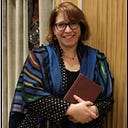A False Divide between Particularism and Universalism- Introduction to the Yom Kippur Prophetic Reading
The Jewish community often speaks about the “particular” — our obligations to our own community and “universal” — obligations to our wider human community as two separate impulses of Judaism — often set up as an either/or binary choice.
Yet this is not how our ancient ancestors viewed Judaism, not the authors of the Torah and not the prophets who provided a moral framework for ancient to contemporary times.
For prophets like Isaiah, whom we read from this morning, our Jewish ritual obligations were meant to sensitize us to the plight of anyone suffering or in need — fasting, showing contrition is a training ground for day to day acts of tzedakah and tzedek. And, our actions of tzedakah and tzedek bring us meaning and purpose that then drives our religious and spiritual observances.
It is not a binary choice.
It is instead a continual, unending loop of practice and action and practice and action and practice….Our particular deeds inform universal action. Our obligations to self and community support and inspire obligations to the other, which in turn deepens our practice of Judaism.
This is what I understand to be the deeper message of the Haftarah reading on Yom Kippur, the stirring words of the prophet Isaiah about the fast that is indeed required and about the Sabbaths that we need to tend to keeping: Our religious obligations and our obligations to the other are one.
